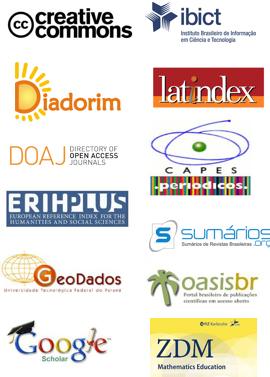O Desenvolvimento do Pensamento Algébrico em Estudantes com Deficiência Intelectual pela Perspectiva Histórico-Cultural
DOI:
https://doi.org/10.17921/2176-5634.2022v15n2p203-213Resumo
Resumo
São discutidos elementos que potencializam a aprendizagem conceitual matemática em estudantes com deficiência intelectual (DI) no Atendimento Educacional Especializado, a responder à pergunta de que forma é possível contribuir com o desenvolvimento do pensamento algébrico em estudantes com DI? Participaram do estudo três estudantes com diagnóstico de DI matriculados no Ensino Fundamental Anos Finais, caracterizando-se a pesquisa como Estudo de Caso. O escopo teórico é sustentado pela teoria Histórico-Cultural, especificamente nos estudos de Vigotski (2008, 2010, 2018, 2019). Os registros de dados empíricos foram coletados a partir do desenvolvimento de cinco tarefas de estudos algébricos, denominadas “Seguir os números” (01, 02, 03, 04, 05), todos filmados, com transcrições para efetivação das análises, a partir da Análise Textual Discursiva. Como resultado, são apontados que os alunos participantes mobilizaram o pensamento algébrico a partir das tarefas de estudos propostas; ampliaram a assimilação de alguns conceitos básicos da álgebra, como identificação e análise de regularidades, padrões, relações numéricas e sequências de números pares e ímpares; realizaram contagem por saltos, além da mobilização de processos de abstração e generalização. A pesquisa contribui com a prática pedagógica de professores que orientam suas ações docentes na perspectiva da Educação Inclusiva, de modo a ampliar os entendimentos sobre o desenvolvimento do pensamento algébrico e da assimilação de conceitos matemáticos em estudantes com DI.
Palavras-chave: Deficiência Intelectual. Inclusão Escolar. Atendimento Educacional Especializado. Aprendizagem Conceitual Matemática.
Abstract
There will be discussed elements that optimize the mathematical conceptual learning in students with intellectual disability in the Specialized Educational Service, to answer the question: How to contribute with the algebraic thought development in students with intellectual disability? Three students with intellectual disability registered in the last years of Elementary School participated the research, characterizing as study case. The theoretical scope is underpinned by the Historical-Cultural theory, specifically on Vigotski’s studies (2008, 2010, 2018, 2019). The empirical data were collected from the development of five study activities called: “Seguir os números” (01, 02, 03, 04 and 05), with everything filmed, and transcriptions for analysis, by the Discursive Textual Analysis. As results, it is pointed out that the participant students mobilized the algebraic thought from the proposed study activities, increased the assimilation of some fundamental concepts of algebra, such as identification and analysis of regularities, patterns, numerical relations and sequences of even and odd numbers, executed hop counting, besides the mobilization of abstraction and generalization processes. The research contributes with the pedagogical practice of teachers that guide their actions on the perspective of the inclusive education, in order to increase the understanding about the algebraic thought’s development and the mathematical concept’s assimilation in students with intellectual disability.
Keywords: School Inclusion. Specialized Educational Service. Mathematical Conceptual Learning.


